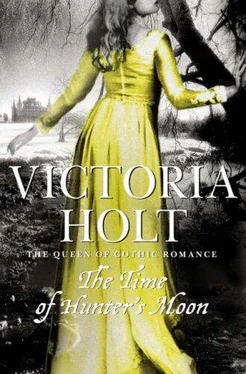We ate the midday meal at the big wooden kitchen table with the windows wide open to the smell of new mown corn, and we listened and joined in the talk of the harvest.
"It's a pity you won't be here for the harvest home," said John. He seemed so different from the immaculate gentleman who had called on us at Moldenbury. I felt-and I knew the others did too-that I had known him for a very long time.
"Perhaps we could be," said Teresa hopefully.
"Teresa," I said, "we have to go back to school soon."
"Don't talk of it," replied Teresa gloomily.
John told us about the harvest home and the festival. "It's the best time of year. The children make the corn dollies when it is ail gathered in."
" `Ere the winter storms begin,'" quoted Violet.
"And we hang them on the walls. They are talismans in the hope of getting a good harvest next year."
"We used to do that in my home," said Violet. "It's a universal custom," added John. "And I think it goes back to the Middle Ages."
"I like to see the old ways kept up," said Violet.
I think she was the one who amazed us most. She was really enjoying being at Forest Hill. She had taken over the kitchen. The manager's wife, who usually looked after the household when the family was there, was only too pleased to pass over the responsibilities, and Violet was in her element. She grew quite sentimental talking about her childhood.
In spite of the happy time we had I could not get Lydia out of my mind and when John told me: "You have Lydia's bedroom!" I seemed to sense her there and I dreamed of her once or twice.
I thought I heard her voice in my dreams. "You mustn't worry about me, Cordelia. I'm dead."
I woke up with the words echoing in my ear. The light curtains were blowing outward, for the wind had arisen and the window was wide open. Startled from my sleep, I thought it was a ghost standing there.
"Lydia!" I cried and sat up in bed.
Then I saw what it was and, getting out of bed, half shut the window. It seemed quite chilly.
I went back to bed but not to sleep. I kept going over days long ago, remembering Lydia.
But in the morning I forgot her and was out in the fields laughing with the rest of them.
John came with us to London. He was going to Kensington which he did after putting us on the train to Moldenbury.
"It was a wonderful week," said Teresa. "Oh, I do like John."
The holiday was coming to an end. The next day Teresa and I would leave for Colby.
On that last night, after everyone else had retired Aunt Patty came to my room for one of her chats.
"It was a very happy holiday after all," she said. "I like the Markhams."
"Yes, what a happy family. I think they are all feeling the loss of Lydia."
Aunt Patty was silent for a few seconds. Then she said: "I think John Markham is half way to falling in love with you, Cordelia."
"Oh, Aunt Patty, I've known him such a short time. You're very romantic."
"I know you think I'm an ignoramus in these matters because I am an old spinster living in the country. But I do send to Mudies for my three-volume novels and the goings on in them is something of an eye-opener, even to a silly old spinster like me."
I put my arms round her and kissed her. "I don't allow disparaging remarks about you, even when you make them yourself."
"It was such a lovely house." She looked a little wistful. "I often think of your being married and having babies. Do you know, I should love some babies."
"Oh, dear Aunt Patty. I'm sorry I can't oblige."
"You will one day, I don't doubt. I just thought what a lovely household that was... how friendly and easy to get on with. I think John Markham is such a good man. You could put your trust in him. You'd know that he would always be there when needed ... to do what was best."
"I'm sure he's all that."
"I daresay we shall be seeing more of him."
I laughed. "You're weaving dreams of romance, Aunt Patty."
"Do you think they are only dreams? I know the signs. You smile. That is because you are considering my lack of experience in such matters. I am not wholly ignorant. I might have married once... only it went wrong."
"You never told me."
"It was not worth telling. He met someone else."
"What a fool he must have been."
"He was very happy, I believe. Life is a matter of taking the right road at the right time. Time is the important thing ... opportunity too ... and they must come together. The important thing is to recognize the opportunity while there is time. Cordelia, when the time comes, you must make the right choice. Good night, my dearest child."
She held me tightly against her.
"I was always comforted when you held me like that," I said. "You did, the first time we met. I remember the hat and the smell of lavender ... and it was just the same then."
"It will always be, Cordelia," she said.
Then she kissed me and went out.
THE new term had begun. Daisy called her usual pre-school conference and we were all assembled in her study. "We will do our best," she said, "to forget the events of last term. The girls should be under closer supervision when they are out ... even riding. It was fortunate that the girl involved was Fiona Verringer and that it was from her own home that she finally escaped, and not the school. If it had been one of the others, there could have been unpleasant difficulties with the parents. However, we must guard against such eventualities. I gather from Sir Jason Verringer that he has no idea of the whereabouts of Fiona and her husband, though he actually visited the Continent in search of them. Well, we will hope for a more peaceful term. We don't want too much gossip among the girls. The incident should not be referred to. Girls are inclined to admire those who do foolish things. Another elopement would be a disaster for the school. So ... that matter is closed.
"It would be a good idea to get them started on some entertainment for the Christmas festivities. It seems early to think of that, but it would keep the girls' minds occupied. Say scenes from Shakespeare ... little extracts which they could act before the school. It makes for excitement and speculation and keeps their minds busy.
"Miss Grant, I am putting Charlotte Mackay back in Eugenie Verringer's room. They were together originally and have always been good friends. I thought it would help Eugenie. She must be missing her sister. She spent her holiday at the Mackay's place up north near Berwick. I don't want Eugenie brooding too much about her sister. It was a good idea to let her go to the Mackay's place rather than stay at the Hall to be reminded that her sister was no longer there. Eugenie's is not a very placid temperament to begin with and girls like that can be difficult in so many ways.
"There is a new girl. Margaret Keyes. She seems a pleasant creature. She can go into Charlotte's place with Patricia Cartwright."
She went on to discuss other aspects of the term and finally we were dismissed to go to our rooms and "settle in" as she called it.
That night I made my rounds. They were all safely in their beds and seemed demure enough, even Charlotte and Eugenie, though Charlotte did give me a somewhat triumphant look as though to remind me of that first night at school when there had been a contretemps over who should sleep in whose room.
The first few days passed uneventfully until one night when I was awakened from sleep by a figure standing by my bed and I heard a voice saying urgently: "Miss Grant. Miss Grant."
I started up. Charlotte was standing there. "Charlotte!" I cried. "What's wrong?"
"It's Eugenie," she said. "She's ill."
I hastily put on my dressing gown and slippers and followed her to their bedroom. Eugenie was lying back looking very white; there were beads of perspiration on her forehead. It felt clammy.
Читать дальше










